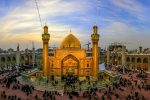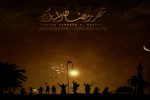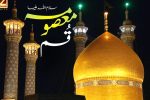The Short Life History of Hazrat Abbas (A.S)
It was the fourth of Sha’ban in the year 26 AH. In the holy city of Medina, a man came running to the Prophet’s Mosque. He stood for a moment at the door looking among the worshippers for some particular person.He was excited and when he spotted the Prophet’s cousin and son-in-law, Imam Ali ibn […]

It was the fourth of Sha’ban in the year 26 AH. In the holy city of Medina, a man came running to the Prophet’s Mosque. He stood for a moment at the door looking among the worshippers for some particular person.
He was excited and when he spotted the Prophet’s cousin and son-in-law, Imam Ali ibn Abi Taleb (PBUH), he rushed towards him breathlessly, shouting I have good news for you.The man was none other than Qanbar the faithful servant of the Imam.
He wiped the sweat off his forehead and said my master I am coming from your house now and God Almighty has blessed with another son. I have come to give you this good news and ask what should he be named. Happiness could be seen in the Imam’s eyes. He smiled and said this child has a high status before God. I will come home now. I will name this son Abbas like my Uncle. That day was the fourth of Shaban.
Many experts in psychology believe inheritance; education and the surrounding environment play important roles in forming human beings’ personality. In this regard, Hazrat Abbas grew up under special conditions.
He grew up in a house where worldly ornaments were not important, but which was filled with the light of God and love for humanity and its ethereal values. He grew up among brothers as noble as the Prophet’s two grandson Imam Hassan and Imam Hussein (pe ace be upon them). He grew up in a household on whom the Prophet had asked God to bestow His blessings. This house was the place of hope and refuge of the world.
It was the habit of Imam Ali (PBUH) to cultivate and irrigate the palm groves and then endow them to the needy. Abbas acquired these qualities from his father as well as from his brothers Imam Hassan and Imam Hussein (peace be upon them), the illustriou s sons of the Prophet’s impeccable daughter Hazrat Fatemah (peace be upon her) who had long expired.
He soon adorned himself with the highest human characteristics. Hazrat Abbas’ life was filed with knowledge and love.
He was wise and knowledgeable as well as tall, handsome and brave. Among the Arabs it was a tradition to name beautiful children Qamar or moon. And Hazrat Abbas acquired the epithet of Qamar-e Bani Hashem or the Moon of the Bani Hashem Clan.He was also polite and patient and this was a reminder of his father’s words that No heritage is worthier than politeness.
Hazrat Abbas, who was brought up in such a congenial atmosphere never sat down without permission in front of his brothers Imam Hassan and Imam Hussein (peace be upon them).
He respected the high status of his brothers as the heirs of his father and the righteous successors of Prophet Mohammad (blessings of Allah be upon him and his progeny). Soon his knowledge and wisdom reached a level in which the scholars of his era become humble before him. Hazrat Abbas since his youth showed signs of bravery and courage alongside his father Imam Ali (PBUH).
During the Siffeen war against the rebel governor of Syria Mua’wiyah ibn Abu Sufyan, when the enemies blocked water to camp of the Muslims, Hazrat Abbas who was in his early teens entered the battlefield with a veil on his face to hid his true identity. Mua’wiyah ordered one of his powerful men Abu Shasa to confront him.
The Syrian arrogantly said People compare my bravery to a thousand riders, now you want me to fight this young boy Abu Shasa sent his youngest son to confront him. But his son was soon defeated and killed. Abu Shasa then sent his other son, but to his surprise, he was also killed. Then Abu Shasa fuming with rage swallowed his proud words and personally entered the battlefield seeking to avenge the death in combat of his sons. But the boy was such valiant that he defeated him and made swift work of th e infidel.
At this sight, the Muslim army rejoiced and felt surprised at the bravery of the young masked lad. Imam Ali (PBUH) called the youth and took the mask off his face. Then everyone saw that the brave youth was no one but Hazrat Abbas.
During the era of Imam Hassan (PBUH), Hazrat Abbas stood steadfastly at his side despite the plots of the enemies to snatch away the political leadership of the Ummah from the Prophet’s elder grandson. Despite his courage, Hazrat Abbas always followed th e Imam and was patient.
He retired with the Prophet’s Household to Medina from Kufa in Iraq when the rebel Mua’wiya deceived the Iraqi people and forced Imam Hassan (PBUH) to sign a peace treaty relinquishing the caliphate. Ten years later when Imam Hassan (PBUH) was martyred through poisoning, the divine right of imamate came to rest on the shoulders of the Prophet’s younger grandson Imam Hussein (PBUH). Hazrat Abbas proved loyal and true to the Imam as always.
He was a faithful and trustworthy advisor. So devoted was Abbas that he never left the side of his beloved brother Imam Hussein (PBUH). The height of the greatness of the personality of Hazrat Abbas reached its peak in Karbala and the heroic martyrdom. In chaotic conditions when the people were entangled with worldly desires and succumbed to the offer of posts, he became the Imam’s flag bearer and led his troops.
Guarding the Imam, protecting the tents of the womenfolk of the Prophet’s household, caring for the children and making a sacrifice to bring water to the thirsty camp of Imam Hussein (PBUH) were among the most beautiful and epical manifestations of his l ife in Karbala.
In reality in Karbala Hazrat Abbas’ effort to satisfy God and carry out his duty, astonished the world. In Karbala Yazid’s troops cut the water supply to the Imam’s camp. When the young children could no longer tolerate thirst, Hazrat Abbas volunteered to bring them water. But this was almost impossible.
With his courage, he drove away hordes of enemies and reached the banks of the River Euphrates. Although he was thirsty himself, he never drank a drop of water. After filling the goatskin water-carrier, while he was making his way towards the Imam’s camp , the cowardly enemy attacked him from all sides. One of his hands was severed when he was struck from behind.
He fought single-handedly with his left arm, which was also severed by the Omayyud marauders. Nevertheless, he spurred his horse towards the Imam’s camp hoping to take water to the thirsty children. Alas, he was not destined to do so. The enemies burst upon him like a pack of jackals and shot arrows in his eye and at his chest piercing the goatskin water-carrier and making the water flow on the ground.
Hazrat Abbas thus drank the cup of eternal martyrdom in this valiant name and the memory of this great sacrifice will remain eternal in history. In 10th muharam even many non-Muslims bow at the threshold of Hazrat Abbas in Karbala and beseech God Almighty t hrough him.
Imam Zain ol-Abedin says about his uncle Hazrat Abbas, My uncle Abbas will have such a high status before God on the day of resurrection that all the martyrs will envy him.
Titles of Hazrat Abbas (a.s.)
1-Qamar-e-Banihashem (The Moon Of Banihashem’s Progeny)
This was his most famous nickname. The reason behind that was his good looking face which was resembled to the moon.
2-Saqqa’ (The One Who Brings Water)
This is his another famous nickname.Since he was dealing with bringing water to Imam Hussein (A.S)’s camps and supplying Imam’s thirsty children with water, he was given this nickname.
3-Hamel-ul-Lava’ (The One Who Carries the Flags)
This nick name was given to him because he was the one who carried the flag in Imam Hussein (A.S)’s troop.
4-Raees-e-Askar-al-Hussein (the Commander of Imam hussain(a.s.)’s troops)
This nickname was given to him because he was the commander of Imam hussain (as.)’s troops.
Source: www.alhassanain.org/english
این مطلب بدون برچسب می باشد.










Leave a Reply